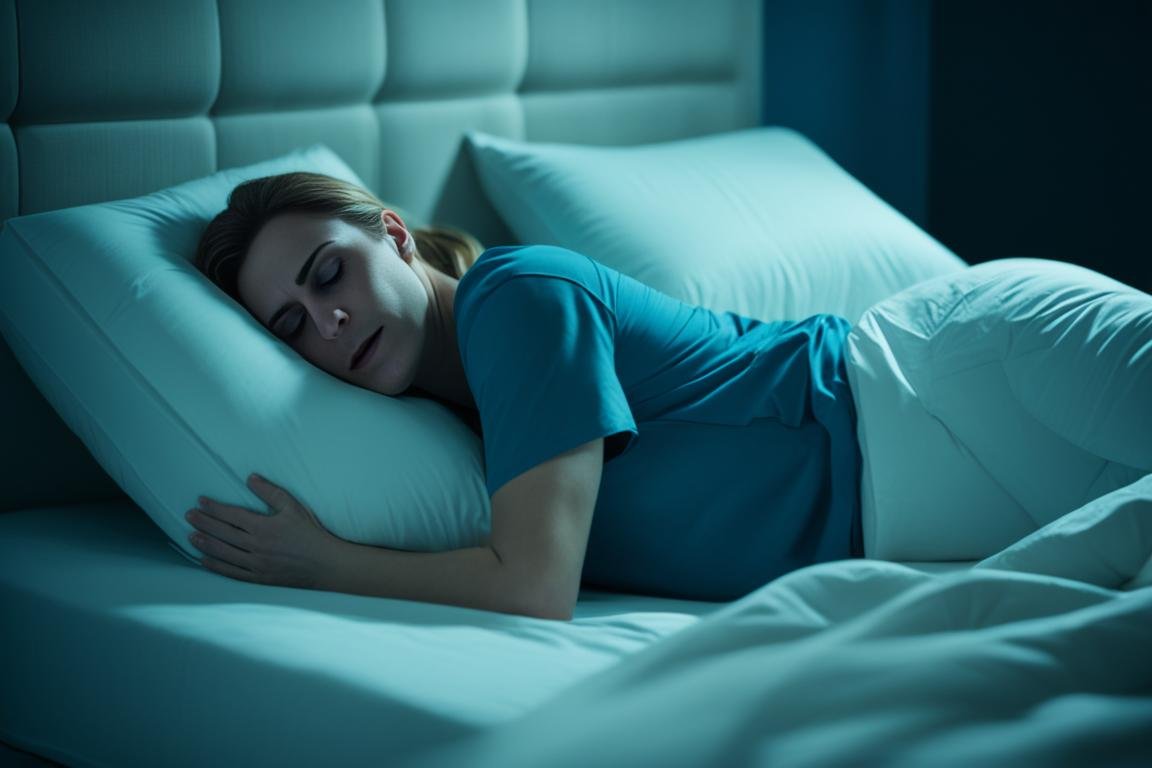Experiencing hip pain when sleeping on your side is common and frustrating. It may come from how you sleep or issues with your mattress. It could also be due to things like hip arthritis, hip bursitis, or hip tendonitis. This article offers tips to help you get relief for your hip pain when sleeping on your side. It talks about changing your sleep position, using the right pillows, and considering physical therapy or medical advice. By dealing with the main causes and managing pain well, you can get better sleep. You’ll wake up feeling more relaxed.
Key Takeaways
- Hip pain when sleeping on your side can have various causes, including sleeping position, mattress issues, and underlying conditions.
- Adjusting your sleep position and using supportive pillows can provide immediate relief for nighttime hip pain.
- Seeking long-term solutions like physical therapy and medical treatments can help address the underlying causes of your hip pain.
- Staying active, flexible, and fit can aid in preventing hip injuries and promoting healing.
- Consulting with a healthcare professional is recommended if hip pain persists despite self-care techniques.
Common Causes of Hip Pain While Sleeping
Bursitis can cause hip pain at night. It’s worse for those who sleep on their side. The bursae are like tiny pillows filled with fluid. They ease movement at the hip joint.
In bursitis, these cushions get inflamed. This makes the hip hurt when you touch it or lay on it. This happens from using the hip too much, getting hurt, or from some diseases like arthritis. Signs of bursitis are pain on the outside of the hip and upper thigh. It can also hurt a lot when you touch the area or lay on it.
OA is a reason for hip pain during the night too. It breaks down the cartilage that protects the hip joint. This causes the hip to hurt a lot, get stiff, and you can’t move it as much. If you have hip OA, you might feel pain in the groin or thigh. You might also have stiffness in the morning and find it hard to stand or walk.
Hip Tendonitis
In hip tendonitis, the tendons that connect the hip muscles hurt. This can give you a deep ache in the groin area. It happens more when you go up stairs or stand up. Overusing the hip, doing the same movements again and again or diseases like arthritis can cause this.
Sciatic-Piriformis Syndrome
Sciatic-piriformis syndrome is when a muscle in the buttocks presses on the sciatic nerve. This is painful, and it makes your leg or foot tingle or go numb. It hurts the hip more at night, especially when you lay on the sore side. You might feel a burn in the calf or have foot pain that wakes you up.
Hip Pain Sleeping on Side: Positioning Matters
Many people sleep on their side. This can make hip pain worse. The hip on the bottom has more weight, causing a lot of pressure. A soft mattress makes it worse. It also makes the other hip lean forward, adding to the pain.
Side Sleepers and Hip Pain
Sleeping on your side can make hip pain worse. The bottom hip gets more weight. This puts a lot of pressure on it, especially with a soft mattress. This makes the hip sink too much, making it hurt more.
Sleeping on Back for Hip Pain Relief
Sleeping on your back can help hip pain. It spreads the weight out better. If back sleeping is hard, use a pillow. Put it between your knees or under your lower back. This keeps your hips in line.
Using Pillows for Hip Alignment
Pillows can keep your hips in the right position. Put one between your knees. It’ll help keep your hips straight. Or, use a wedge-shaped pillow under your hip. This gives extra support and keeps pain away.
Pregnancy and Hip Pain at Night
Being pregnant might make your hips hurt at night, especially in the last three months. Your baby’s weight and growth can stress your back and hips. This can cause sciatica, leading to hip pain. Your body getting ready for birth and changing hormones might make your joints feel loose and achy.
Causes of Pregnancy-Related Hip Pain
About 32% of pregnant women have some hip pain. This usually happens as the baby grows, especially in the second and third trimesters. Doctors say it’s okay to gain 11 to 40 pounds when pregnant. But if you’re a bit lighter, gaining 25 to 35 pounds is good. Transient osteoporosis may also cause hip pain. It’s a condition that affects the hips and might be linked to low calcium and potassium.
Also, sleeping on your side can press on your hips and lead to pain.
Pregnancy Pillows for Side Sleeping
If you’re pregnant and your hip hurts when you sleep on your side, a pregnancy pillow might help. They are made to support your hips, back, and belly. This keeps your body in good shape and lessens the stress on your joints. You can find pregnancy pillows of different shapes and sizes to fit your sleeping style and body.
Immediate Relief for Hip Pain While Sleeping
Changing Sleep Positions
Is hip pain stopping you from sleeping well? Try sleeping in different ways right away. You can lie on your back or on the other side. Use pillows to help keep your hips straight and not in pain.
These small changes can make a big difference. They can lower how much stress is on your hip. This makes it easier for you to sleep without pain.
Using Pillows and Wedges for Support
Changing how you sleep helps. But putting pillows and wedges in the right places does, too. For example, putting a pillow between your knees keeps your hips in the right spot. Using a wedge pillow or a folded blanket under your hip helps, too.
These methods spread your body’s weight better. This takes pressure off your hip. It can make a big difference in how much your hip hurts at night.
Medications and Hot/Cold Therapy
Taking non-prescription anti-inflammatory drugs can lower the swelling in your hip. Drugs like ibuprofen or naproxen can help with the pain. Your doctor might also suggest special creams or stronger painkillers.
Putting cold or hot packs on your hip can also make it feel better. Cold packs work well for swelling. Heat packs relax your muscles and get more blood flowing in your hip.
Long-Term Solutions for Hip Pain at Night
If you have ongoing hip pain sleeping on side that keeps you up, it might be time to see a pro. A physical therapist can get at the root cause. They use special exercises, stretches, and hands-on work to make you feel better. Don’t forget about massage. It loosens up tight muscles and makes moving your side sleeping hip pain easier. These fixes aim to solve main issues leading to hip bursitis side sleeping, hip arthritis side sleeping, or hip tendonitis side sleeping hurt at night.
Injections and Surgical Interventions
Sometimes, simple methods just won’t cut it for harder hip bursitis side sleeping, hip arthritis side sleeping, or hip tendonitis side sleeping pains. Docs might suggest shots to dial down swelling in the hip impingement side sleeping spot. When things are more serious, like bad arthritis or hip fracture side sleeping, surgery might be on the table. Treatments such as arthroscopy or a full-on hip swap can fix the big issue for good.
Hip Replacement Surgery
If you’re at the point of no return, with final stages of hip arthritis side sleeping or a serious hip fracture side sleeping, there’s a big solution. Hip replacement surgery swaps out the bad joint for a new artificial one. This move can cut your pain a lot. It also boosts how well you can move and sleep, leading to a happier life overall.
Preventing Hip Pain While Sleeping
To stop hip pain when you sleep, do some simple things. Try low-impact exercises and stretches. Also, keep good sleep habits. This will lower your chances of waking up with hip pain.
Low-Impact Exercise
Doing gentle exercises everyday helps a lot. It makes the hip muscles stronger. Activities like swimming, walking, and tai chi are good. They help with balance and muscle tone. Avoid sitting too much and do these exercises during the day.
Stretching for Hip Flexibility
Stretch your hips and nearby muscles often. This keeps them flexible. It helps stop hip pain at night. Try exercises like hip crossovers and leg swings. They keep your hips loose.
Sleep Hygiene Tips
Good sleep habits can prevent nighttime hip pain. Have a steady sleep time. Do relaxing things before bed. Stop using phones and tablets before sleep.
A good sleep area is important too. A comfy mattress and pillows support your hips. They reduce pain at night.
When to See a Doctor for Hip Pain
If you have hip pain sleeping on side or side sleeping hip pain, see a doctor. An orthopedic specialist can find the problem. They check if it’s hip bursitis side sleeping, hip arthritis side sleeping, hip tendonitis side sleeping, hip impingement side sleeping, or even hip fracture side sleeping. Then, they will make a treatment plan. This plan might have medicine, therapy, or surgery, based on your pain’s seriousness.
Important to go to the doctor if you see swelling, redness, fever, or can’t walk on that hip. These signs might mean something serious. They need medical help right away.
Hip Pain Sleeping on Side: Mattress Considerations
The mattress you sleep on can make your hip hurt. A soft mattress might let your hip sink too deep. This can press on your hip joint and hurt it.
A mattress that’s very hard isn’t good either. It doesn’t give enough padding for your hip’s bones. You need a mattress that’s in between, not too soft or too hard, to stop hip pain sleeping on side.
Mattress Firmness and Hip Pain
People who sleep on their sides might need a mattress that’s a bit softer. A hard mattress can press on the hips. This blocks blood and makes the hip hurt more.
But, a mattress that’s too soft can be bad. It lets your hips go in too far. Then you may wake up feeling pain or stiff.
Mattress Toppers for Added Support
If your mattress makes your hip hurt, you don’t always need a new one. A mattress topper can be a cheaper fix. Memory foam or latex toppers can make your bed softer and more even.
Using a topper can stop your hips from sinking too deep. It helps your body weight spread out better. Try different toppers to see what feels right for you.
Managing Hip Arthritis Pain at Night
Osteoarthritis (OA) of the hip often causes pain at night. People with this issue feel pain in their hip, thigh, or buttocks. They also find it hard to move in the morning and do weight-bearing tasks. These symptoms can make sleep difficult and cause a lot of stress.
Osteoarthritis and Sleep Disruptions
Over a third of U.S. adults say hip, knee, or foot pain stops them from sleeping well. Osteoarthritis is the main reason for this. It causes pain in the hip, thigh, or buttocks. This makes it hard for 60-70% of people with arthritis to sleep because of the pain. And 65-80% have trouble sleeping too.
Treatments for Arthritis-Related Hip Pain
To handle hip arthritis pain at night, you might need a few steps. This includes changing how you sleep and using special pillows. Your doctor could also suggest drugs, like creams or pills, to lower inflammation and pain. The first choice for arthritis treatment is a cream that doesn’t have steroids. Doing physical therapy and gentle activities can keep your joints strong and mobile. If it’s very serious, you might need steroid shots or even a new hip.
Gluteal Tendinopathy and Side Sleeping
Gluteal tendinopathy is inflammation of the tendons linking the gluteal muscles to the hip. It causes hip pain sleeping on side, especially for those who side sleep. You may feel a dull, deep ache in the groin or buttocks, which gets worse when you do things like climb stairs. This pain can also spread down the thigh, making side sleeping hip pain worse.
Symptoms of Gluteal Tendinopathy
This issue mainly affects women around or after menopause. It often shows up as hip pain sleeping on side. Menopause brings a drop in estrogen levels, which can harm tendon health. Weak hip muscles may also lead to this problem. Getting stronger by doing physical therapy for eight weeks can help a lot.
Treatment for Gluteal Tendon Injuries
Doctors now treat gluteal tendinopathy differently than before. Avoiding usual anti-inflammatory drugs because they might slow healing. They suggest doing specific strengthening exercises with a physical therapist. Treating with platelet-rich plasma injections or tenotomy to remove bad tendon parts is also an option. And, making simple life changes like placing a pillow between your knees while side sleeping hip pain could ease the discomfort.
Conclusion
Nighttime hip pain can be tough, but many remedies can help. Understanding the issues like sleeping position, mattress issues, and more can lead to solutions. By changing how we sleep and using the right support, we can lessen or avoid hip pain while sleeping.
Improving hip health and finding ways to manage pain can help a lot. If hip pain sleeping on side bothers you, taking steps early makes a big difference. This can greatly boost how well we sleep and feel.
For severe side sleeping hip pain, talking to an expert is key. They offer advice tailored to your situation. With their help, better sleep and a happier life can be yours again.




